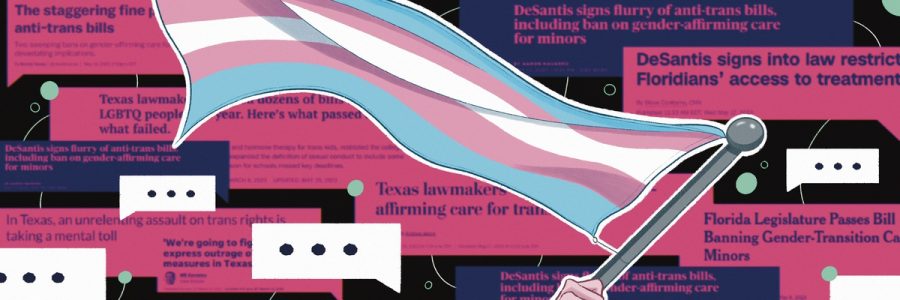The Never-Ending Fight Over Defining the Binary
Jun 4, 2023
Last month, as multiple government officials introduced anti-transgender bills in their respective states, the transgender community is reminded of the fight that got them to this point and how they must continue fighting for their rights.
Exactly two years ago on June 1st, 2021, I wrote a research paper titled “Fair Play” for my AP Language class in high school. The topic of the paper focused on two bills being introduced that targeted transgender girls and women in sports. As time passed, transgender people remain the target of similar bills being introduced in 2023. These bills outline topics that include restrictions on gender-affirming care for transgender youth, education about sexual orientation and gender identity, and how teachers may have to expose details about students to their parents. As transgender rights are at risk country-wide, the voices of transgender people must be uplifted along with their history and fight to create a safe and welcoming environment for all people.
A decade before the first pride parade took place outside the Stonewall Inn in Manhattan, New York, Christine Jorgensen was the first transgender person in the United States to undergo a sex change. After her honorable discharge from the U.S. Army, she began hormone injections in 1950. After returning to America from Denmark once her operations were complete, the media publicized her story as she became an advocate for transgender rights in America. She shared her sentiments in her autobiography titled “Christine Jorgensen: A Personal Biography” (1). She describes her thoughts reflecting on her childhood, thinking she “was a woman trapped in a man’s body.” Her status as a public figure brought light to transgender people in America, as a long fight began in an attempt to solidify transgender people’s rights.
People like Jorgenson helped to popularize words like “transgender” and “gender identity” in America during the 1950s and onward, although ideas of a fluid gender identity existed long before (2). This is proven in various native cultures around the globe, including the idea of a “third gender” belief within the Indigenous people living in North America. Gender itself is a socially constructed role; this explains why it differed from population to population before the development of the commonly held idea of two genders. In reality, gender is subjective and altered due to one person’s beliefs or environment. Traditional gender norms include how a person may view and assign gender to people. Thus, there became a uniformity in Western society: the existence of two genders, man and woman, and how they should act. Undeniably, these roles began to integrate into every aspect of people’s lives, hardly allowing for any disruption or change.
Without delving into the flaws of gender norms, which is an entirely different issue, this idea of gender has overlooked many important factors. Within this standard, gender becomes what you were assigned at birth. The problem with this standard is it fails to include intersex people, who are “born with sex traits that do not fit binary medical definitions of male or female” (3). As children, intersex people face invasive medical intervention to somehow fit them into standard “binary sex stereotypes.” This leads those people to have mental health problems later in life and are also more susceptible to discrimination by medical health professionals and those who wish to push them into the standard binary. This is just one example of how a strict binary is not only harmful but pushes people to fit into a standard they could not adhere to. The same issue exists with transgender people facing scrutiny under such gender norms.
As aforementioned, gender is a social construct and therefore subject to change as a person wills it. Accordingly, as time went on, people created more words to define what they felt accurately portrayed what they felt (or more specifically, their gender identity). In popular culture, people developed umbrella terms to define and acknowledge the scale of gender identity. For example, the term “non-binary” became popular in the 2000s in America, to give a word to those who related to the binary in a more fluid, complex way. People also devised a way to specify commonly used terms to include all people from different backgrounds. The term “cisgender” defined those who identify with their sex assigned at birth. In this way, the term “transgender” was no longer considered a deviation from the norm.
Yet with change and redefinition comes backlash; traditional gender norms in American society feel threatened by change even when people outside these norms existed even before these standards were created. Specifically, transgender rights became a political issue, one that was heavily reliant on the opinion of gender norms and the pushback of inclusivity-encouraging change. In May of this year, Florida Governor Ron DeSantis introduced a bill that “prohibits transgender children from receiving gender-affirming treatments” (4). Under this bill, transgender children receiving gender-affirming healthcare could be removed from their homes, although these treatment options are supported by the American Medical Association. In comments about the legislation being introduced, AMA states that taking away this healthcare prevents doctors from treating transgender children with dysphoria (5). The AMA believes that transgender and non-binary children “are normal variations of human identity and expression,” and that their medical needs would be solved with these treatments. Contrary to the beliefs of the AMA, DeSantis only defines male and female, as having to do with their “specific reproductive roles.” Breaking down the many facets of this law, DeSantis seeks to uphold normalcy and protect the children; yet this bill will negatively impact the transgender youth in Florida.
Earl Warren College junior Manal Vishnoi — who identifies as non-binary — talked about their identity and what it means to them.
“I’m non-binary. I usually use they/them pronouns. To me, it just means that I don’t have a gender per se. I’m not connected to gender,” Vishnoi said.
When asked about the particular law being signed, they pointed out the hypocrisy of the bill, as it would negatively affect transgender youth if they are denied being able to represent who they are. Vishnoi specifically mentioned one aspect of gender-affirming care, puberty blockers, and the fact that they are reversible (6). With DeSantis’ objective being to protect children from changing themselves permanently, if the child grows up and changes their mind, they have the ability to also stop the treatment they had originally planned.
“I mean, they say they care about their children. They don’t want their children to make this huge mistake,” Vishnoi said. “But once again, puberty blockers are not harmful, and the effects are reversible because all it does is stop the progression of puberty. So they don’t care about these trans children. They want these children to suffer from gender dysphoria because they don’t think being trans is an okay thing to be. So the only excuse is transphobia for them, and that’s not okay.”
Evidence suggests that these puberty blockers are reversible, so in the case that the child decides to stop the treatment, the body will undergo puberty like normal. No study has completely proven the reversibility, since no research has been collected on a person that used puberty blockers and grew up with the effects. Since the long-term effects have not been studied, this leaves questions for people like DeSantis, whose purpose is to protect children from making permanent decisions at such a young age. By blocking all gender-affirming medicine like this, DeSantis wants to express his idea of the binary, his idea of the male and female gender.
This idea leaves out previously mentioned intersex people and others that cannot reproduce. This bill provides a platform for DeSantis and others to portray their idea of traditional gender norms. This effort to give meaning to gender is a long-standing one, pushed by multiple people’s efforts to prove a definite truth from boundless, complex ideas. Ideas like DeSantis’ are just one opinion on how the binary should act in society, but gender resonates differently with each person depending on how they grew up.
Thurgood Marshall College junior Kiki Drew grew up learning about their gender identity and was able to use that knowledge to live authentically in their life. They identify as transmasc and knew from a young age about differing ideas regarding gender. Since they had the freedom to learn about various ideas, they were able to feel comfortable with themself. Yet, in Texas in early May, there was a push to place restrictions on how sexual orientations and gender identity would be discussed in schools. Although these bills died before being passed, they provide insight into how people may try to silence ideas that counteract their own. Just like Drew grew up being able to interpret their idea of gender, similarly people grow up with hatred for people and an insistence to construe people’s ideas to one side.
“All this bigotry and hatred is something that’s learned instead of something inherent,” Drew said. “It’s very scary because people [sometimes] aren’t safe at home, and they’re only able to be out and themselves at school.”
These laws, similar to the ones produced in Florida, harm the children they said they would protect. With limited tolerance and understanding for the transgender minority, these lawmakers continue to push laws that would harm children in these states and regress the transgender and LGBTQ population as a whole back to the point where they are fighting for their rights. There is a multi-faceted disagreement on what gender should be. During this battle, transgender and non-conforming people’s rights face numerous setbacks. Vishnoi and Drew will continue to advocate for transgender rights and during this pride month encourage those who identify in the LGBTQ community to stay safe. Despite the attempts to infringe on the rights of LGBTQ people, they both will fight to make sure transgender people are seen and live safely, although it may take a while.
“And we just have to make sure that we’re looking at the long run instead of the short run. Because in my lifetime or from what I can foresee, I don’t expect to reap what I’m sowing in terms of trans-LGBTQ acceptance nationwide. But I would still want future generations to be able to just be free and not have to stress or worry that they’re going to be killed by the state or killed by somebody in their neighborhood,” Drew said.
As pride month commences, the sacrifices of previous generations are honored, and the fighting spirit held by the trailblazers in the movement before will be remembered and reignited today as transgender people show they are here to stay.


















Kyle Reese • Jun 4, 2023 at 11:27 pm
The various thoughts provided, complete with the usual dogma, slogans and activist mantras, miss the mark and avoid the fact that gender ideology policies harm many and help few. gender ideology policies firstly harm dysphoric ppl who ID as “trans”. amsterdam has 50 years of data of people who use gender meds, including hormones and blockers. they say those on these meds die early 2X more than average and commit suicide 20X more than average. they dont start out that way tho. 85% of kids grow out of dysphoria and ID as their birth sex with puberty, as long as they dont take these harmful meds. most grow up to be gay adults. UK and Euro gov reviews found these meds harm kids and dont help anything. its a scam. The US gov has never done a review if these meds help. they dont. the claim that some kids are a magic kind of person who requires sterilizing meds to be happy is false. youve swallowed a fraud. dysphoric ppl had trama, abuse or normal dysphoria from being gay. they need psych care. not harmful meds that cause tons of lifelong problems. there is zero evidence gender meds help anyone. UK medical group feb 2023 report ” Gender dysphoria in young people is rising” explains how we got to a place where some think gender “care” helps. its not based on evidence. its based on the claims of drs who are getting rich off this. that isnt evidence. thats a scam.
gender ideology is a religion that erases the rights of women, kids, gays, parents and dysphoric ppl. women are robbed of spaces safe from biological males. thats misogynistic. kids are robbed of their right to experience puberty when adults promote these harmful meds to address normal psych issues most grow out of. gays are taught that same sex attraction is bigoted and being gay is wrong. gay kids are pushed into care that causes life long sterilization to address temporary psych issues most grow out of. thats homophobic. the list goes on and on. billionaire activists have spent 20 years on a organized PR and lobby campaign that has tricked many. the problem is every gender biz stat and claim is a lie. intersex ppl are .017% of the population, but remain either male or female. you dont speak for them. most intersex ppl oppose your wrong ideas about them. many gays have figured out gender ideology is homophobic.
trans ppl deserve the right to safety in the restrooms of their biological sex where they are safe and respected. they also deserve evidenced based care not harmful quack care pushed by cult activists.